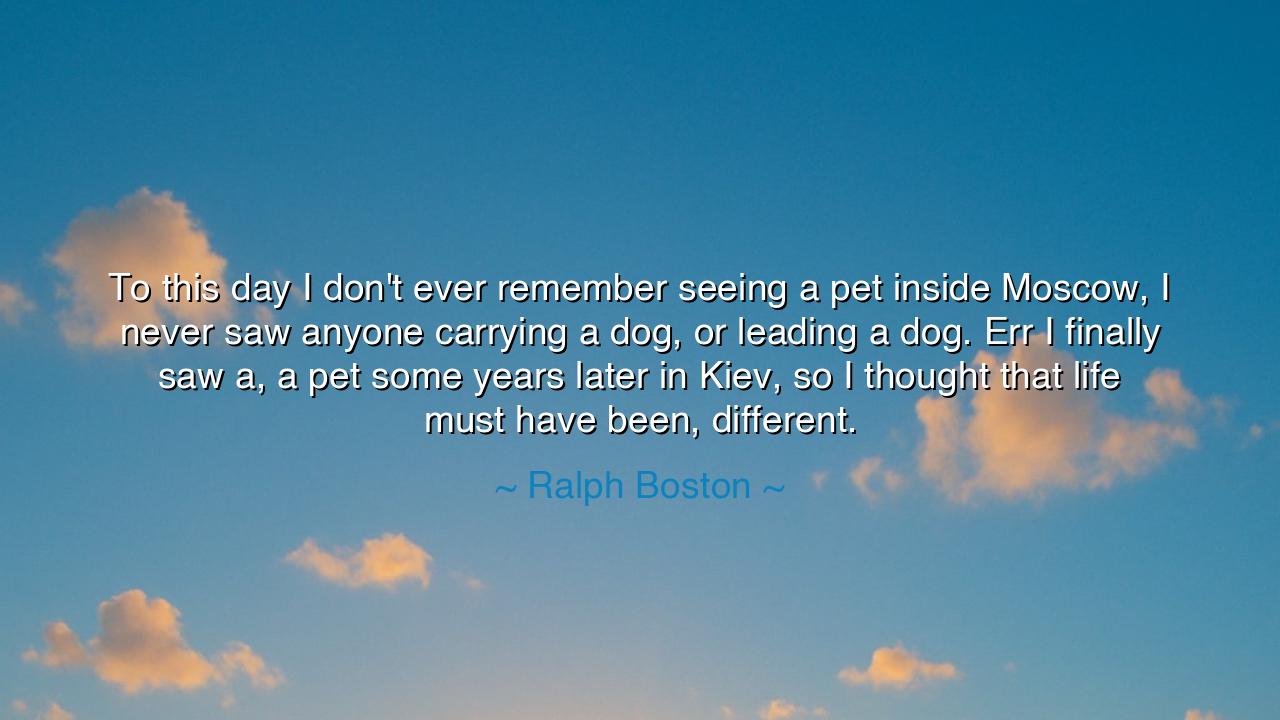
To this day I don't ever remember seeing a pet inside Moscow, I
To this day I don't ever remember seeing a pet inside Moscow, I never saw anyone carrying a dog, or leading a dog. Err I finally saw a, a pet some years later in Kiev, so I thought that life must have been, different.






Hear, O seeker of meaning, the words of Ralph Boston, who reflected: “To this day I don’t ever remember seeing a pet inside Moscow, I never saw anyone carrying a dog, or leading a dog. Err I finally saw a, a pet some years later in Kiev, so I thought that life must have been different.” At first these words appear as a passing observation of a traveler. Yet, when pondered deeply, they reveal an ancient truth about cultures, societies, and the ways that life is expressed differently across the world. What seems ordinary in one place—the companionship of animals—may be absent in another, reminding us that human life is shaped not only by choice but by history, necessity, and tradition.
The absence of visible pets in Moscow, as Boston observed, was not merely the absence of animals but a window into a way of life. In lands where survival was harsh, where winters were long and resources scarce, the keeping of animals as companions may not have been common. What is taken for granted in one land—the dog walking alongside its master, the cat curled at the hearth—may in another land seem foreign, even impractical. Thus the traveler, by his careful observation, discovers not only what is present but also what is absent, and from this absence learns the nature of a people.
The ancients knew this wisdom. Herodotus, the father of history, when traveling among the Persians, Scythians, and Egyptians, recorded not only their customs but also what was lacking in their societies compared to Greece. In these differences he did not judge, but sought understanding. To see no dogs in Moscow was not merely a curiosity; it was the recognition that human culture is many-sided, and that “different” does not mean lesser, but born of other struggles, other climates, other values.
In contrast, Boston’s later sighting of a pet in Kiev brought revelation. It was as though a window had opened, showing him another side of life in Eastern Europe, one more familiar to his own upbringing. The simple sight of a man leading a dog told him that here companionship between man and beast had a place. What had seemed uniform was now revealed as diverse. In this moment, the traveler learns the greatest lesson: never to assume that one’s first impression is the whole truth of a nation or a people.
Consider the tale of Marco Polo, who journeyed to the East and was often astonished by what he saw—or what he failed to see. In China, he marveled at customs of eating, dressing, and trading utterly different from Venice. To him they seemed strange, yet to those who lived there, they were life itself. Just as Polo recorded these marvels, so did Boston’s memory of pets in Kiev become a symbol that life in the Soviet lands was not monolithic but filled with shades and contrasts.
The teaching, O listener, is that the true traveler must not only gaze at monuments and cities but notice the small things: the presence of a pet, the absence of laughter in a street, the colors of bread in a market. These humble signs reveal the soul of a people far more deeply than official speeches or towering palaces. In Boston’s memory of Moscow without pets, and Kiev with them, we see how the ordinary becomes extraordinary, how the unnoticed becomes the very key to understanding.
Practical wisdom follows: when you travel, be watchful of what is absent as much as of what is present. Do not only record what astonishes you but reflect on what you expected to see and did not. Ask yourself why life unfolds differently from place to place. And above all, do not judge by your own customs alone, but open your heart to the possibility that what is “different” carries its own beauty and necessity.
Thus, in the words of Ralph Boston, we are reminded that even the simplest memory—a dog not seen, a pet finally glimpsed—can unfold into a profound lesson about humanity. Life is not one pattern but many, and the wise traveler learns to honor them all.






AAdministratorAdministrator
Welcome, honored guests. Please leave a comment, we will respond soon